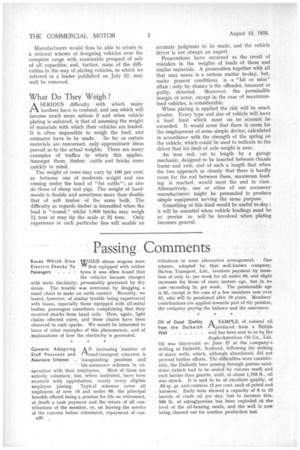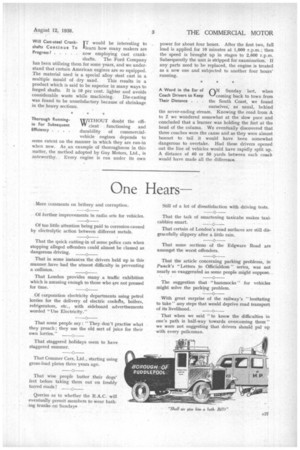Passing Comments
Page 28

Page 29

If you've noticed an error in this article please click here to report it so we can fix it.
Buses Which Give WHEN steam wagons were Electric Shocks To " first equipped with rubber Passengers . . . • tyres it was often found that the vehicles became charged with static electricity, presumably generated by dry steam. The trouble was overcome by dragging a small chain to make an earth contact. Recently, we learnt, however, of similar trouble being experienced with buses, especially those equipped with all-metal bodies, passengers sometimes complaining that they received shocks from hand rails. Here, again, light chains effected cures, and these chains have been observed to emit sparks. We would be interested to learn of other examples of this phenomenon, and of explanations of how the electricity is generated.
Concerns Adopting A N increasing number of Staff Pensions and "road-transport concerns is Assurance Schemes . inaugurating pensions and life-assurance schemes in cooperation with their employees. Most of them are entirely voluntary, but, where instituted, have been received with approbation, nearly every eligible employee joining. Typical schemes cover all employees of over 18 and under 60, the principal benefits offered being a pension for life on retirement, at death a cash payment and the return of all contributions of the member, or, on leaving the service of the concern before retirement, repayment of con a26 tributions or some alternative arrangement. One scheme, adopted •by that well-known company, Barton Transport, Ltd., involves payment by members of only Is. per week for all under. 40, and slight increases for those of more mature age, but in no case exceeding 2s. per week. The pensionable age is 65, except in the case of a few members now over 55, who will be pensioned after 10 years. Members' contributions are applied towards part of the pension, the company paying the balance and the assurance.
Oil of Good Quality A SAMPLE of natural oil
from the Dalkeith
Well r-kproduced from a British
well has been sent to us by the
Anglo-American Oil Co., Ltd. Oil was discovered on June 27 at the company's drilling at Dalkeith, Scotland, following the sinking of many wells, which, although abandoned, did not prevent further efforts. The difficulties were considerable, the Dalkeith bore passing through porous sandstone (which had to be sealed by viscous mud) and rock harder than granite, until, at about 1,750 ft., oil was struck. It is said to be of excellent quality, of .83 sp. gr. and contains 12 per cent, each of petrol and kerosene. Early tests showed a capacity of 8 to 10 barrels of crude -oil per day, but to increase this, 500 lb. of nitroglycerine has been exploded at the level of the oil-bearing sands, and the well is now being cleaned out for another production test. Will Cast-steel CrankfT would be interesting to shafts Continue To 'learn how many makers are
Progress now employing cast crank
shafts. The Ford Company has been utilizing them for some years, and we understand that certain American engines are so equipped. The material used is a special alloy steel cast in a
multiple mould of dry sand. This results in a product which is said to be superior in many ways to forged shafts. It is 10 per cent. ligiter and avoids considerable waste while machining. Die-casting was found to be unsatisfactory because of shrinkage in the heavy sections.
WITHOUT doubt the effi VV cient functioning and durability of commercialvehicle engines depends to some extent on the manner in which they are run-in when new. As an example of thoroughness in this matter, the method adopted by Guy Motors, Ltd., is noteworthy. Every engine is run under its own
Efficiency .
power for about four hours. After the first two, full load is applied for 10 minutes at 1,000 r.p.rn.; then the speed is brought up in stages to 2,600 r.p.m. Subsequently the unit is stripped for examination. If any parts need to be replaced, the engine is treated as a new one and subjected to another four hours' running.
A Word in the Ear of nN Sunday last, when Coach Drivers to Keep ‘-icoming back to town from Their Distance . . the South Coast, we found ourselves; as usual, behind the never-ending stream. Knowing the road from A to Z we wondered somewhat at the slow pace and concluded that a learner was holding the fort at the head of the column. We eventually discovered that three coaches were the cause and as they were almost bonnet to tail it would have been somewhat dangerous to overtake. Had these drivers opened out the line of vehicles would have rapidly split up. A distance of 40 or 50 yards between each coach would have made all the difference.




















































































